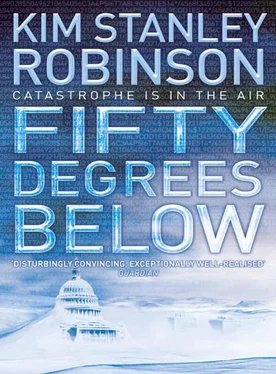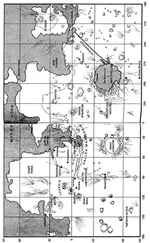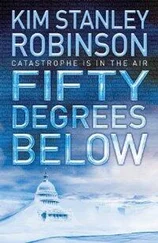He got out of his car and took the elevator to the third floor, where there was a little exercise room, with a men’s room off its entryway that included showers. In his shoulder bag he carried his laptop, his cell phone, his bathroom kit, and a change of clothes. The three shower stalls stood behind white curtains, near an area with benches and lockers. Beyond it extended the room containing toilets, urinals, and a counter of sinks under a long mirror.
Frank knew the place, having showered and changed in it many times after runs at lunch with Edgardo and Kenzo and Bob and the others. Now he surveyed it with a new regard. It was as he remembered: an adequate bathroom, public but serviceable.
He undressed and got in one of the showers. A flood of hot water, almost industrial in quantity, washed away some of the stiffness of his uncomfortable night. Of course no one would want to be seen showering there every day. Not that anyone was watching, but some of the morning exercisers would eventually notice.
A membership in some nearby exercise club would provide an alternative bathroom.
What else did one need?
Somewhere to sleep, of course. The Honda would not suffice. If he had a van, and an exercise club membership, and this locker room, and his office upstairs, and the men’s rooms up there … As for food, the city had a million restaurants.
What else?
Nothing he could think of. Many people more or less lived in this building, all the NSF hardcores who spent sixty or seventy hours a week here, ate their meals at their desks or in the neighborhood restaurants, only went home to sleep – and these were people with families, with kids, homes, pets, partners!
In a crowd like that it would be hard to stick out.
He got out of the shower, dried off (a stack of fresh white towels was there at hand), shaved, dressed.
He glanced in the mirror over the sink, feeling a bit shy. He didn’t look at himself in mirrors anymore, never met his eye when shaving, stayed focused on the skin under the blade. He didn’t know why. Maybe it was because he did not resemble his conception of himself, which was vaguely scientific and serious, say Darwinesque; and yet there in the glass getting shaved was always the same old sun-fried jock.
But this time he looked. To his surprise he saw that he looked normal – that was to say, the same as always. Normative. No one would be able to guess by his appearance that he was sleep-deprived, that he had been thinking some pretty abnormal thoughts, or, crucially, that he had spent the previous night in his car because he no longer had a home.
‘Hmm,’ he told his reflection.
He took the elevator up to the tenth floor, still thinking it over. He stood in the doorway of his new office, evaluating the place by these new inhabitory criteria. It was a true room, rather than a carrel in a larger space, so it had a door he could close. It boasted one of the big inner windows looking into the building’s central atrium, giving him a direct view of the big colored mobile that filled the atrium’s upper half.
This view was unfortunate, actually. He didn’t want to look at that mobile, for not too long ago he had found himself hanging upside down from it, in the middle of the night, working desperately to extricate himself from an ill-conceived and poorly executed break-and-enter job. He had been trying and failing to recover a poorly-worded resignation letter he had left for Diane Chang, the NSF director. It was an incident he would really rather forget.
But there the mobile hung, at the new angle which Frank had given to it and which no one had noticed, perhaps a reminder to – to what? To try not to do stupid things. To think things through before attempting them. But he always tried to do that, so the reminder was unnecessary. Really, the mobile outside his window was a disadvantage. But drapes could be installed.
There was room for a short couch against one wall, if he moved the bookcase there to the opposite corner. It would then be like a kind of living room, with the computer as entertainment center. There was an ordinary men’s room around the corner, a coffee nook down the hall, the showers downstairs. All the necessities. As Sucandra had remarked, at dinner once at the Quiblers’, tasting spaghetti sauce with a wooden spoon: Ahhhh – what now is lacking?
Same answer: Nothing.
It had to be admitted that it made him uneasy to be contemplating this idea. Unsettled. It was deranged, in the literal sense of being outside the range. Typically people did not choose to live without a home. No home to go home to; it was perhaps a little crazy.
But in some obscure way, that aspect pleased him too. It was not crazy in the way that breaking into the building through the skylight had been crazy; but it shared that act’s commitment to an idea. And was it any crazier than handing well over half of your monthly take-home income to pay for seriously crappy lodging?
Nomadic existence. Life outdoors. So often he had thought about, read about, and written about the biological imperatives in human behavior – about their primate nature, and the evolutionary history that had led to humanity’s paleolithic lifestyle, which was the suite of behaviors that had caused their brains to balloon as rapidly as they had; and about the residual power of all that in modern life. And all the while, through all that thinking, reading, and writing, he had been sitting at a desk. Living like every other professional worker in America, a brain in a bottle, working with his fingertips or his voice or simply his thoughts alone, distracted sometimes by daydreams about the brief bursts of weekend activity that would get him back into his body again.
That was what was crazy, living like that when he held the beliefs he did.
Now he was considering acting in accordance with his beliefs. Something else he had heard the Khembalis say at the Quiblers’, this time Drepung: If you don’t act on it, it wasn’t a true feeling.
He wanted these to be true feelings. Everything had changed for him on that day he had gone to the Khembali ambassador’s talk, and then run into the woman in the elevator, and afterward talked to Drepung at the Quiblers’ party, and then, yes, broken into the NSF building and tried to recover his resignation. Everything had changed! Or so it had felt; so it felt still. But for it to be a true feeling, he had to act on it.
Meaning also, as part of all these new behaviors, that he had to meet with Diane Chang, and work with her on coordinating NSF’s response to the climate situation that was implicated in the great flood and many other things.
This would be awkward. His letter of resignation, which Diane had never directly acknowledged receiving, was now an acute embarrassment to him. It had been an irrational attempt to burn his bridges, and by all rights he should now be back in San Diego with nothing but the stench of smoke behind him. Instead, Diane appeared to have read the letter and then ignored it, or rather, considered how to use it to play him like a fish, and reel him back into NSF for another year of service. Which she had done very skillfully.
So now he found that he had to stifle a certain amount of resentment as he went up to see her. He had to meet her secretary Laveta’s steely eye without flinching; pretend, as the impassive black woman waved him in, that all was normal. No way of telling how much she knew about his situation.
Diane sat behind her desk, talking on the phone. She gestured for him to sit down. Graceful hands. Short, Chinese-American, good-looking in an exotic way, businesslike but friendly. A subtly amused expression on her face when she listened to people, as if pleased to hear their news.
As now, with Frank. Although it could be amusement at his resignation letter, and the way she had jiu-jitsued him into staying at NSF. So hard to tell with Diane; and her manner, though friendly, did not invite personal conversation.
Читать дальше












